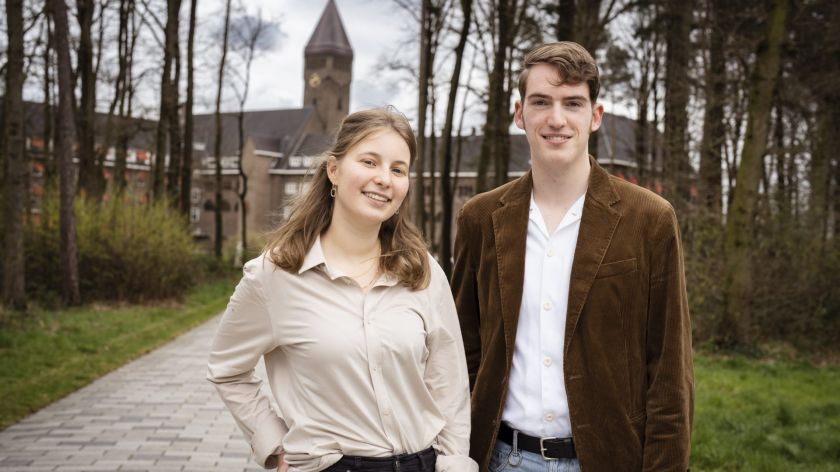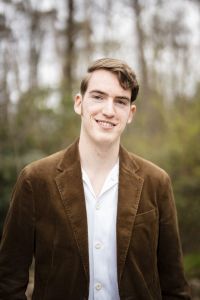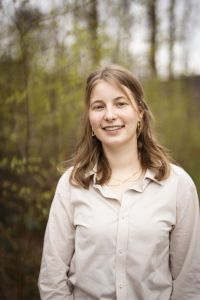New student party turns participational bodies on their heads: ‘Our constituents are active students’
-
 Dieke Westerink en Derk Wijkamp. Foto: Johannes Fiebig
Dieke Westerink en Derk Wijkamp. Foto: Johannes Fiebig
There is a new student party on the Radboud University campus: V.O.S. The party, which aims to represent Nijmegen’s umbrella associations, will be competing for one of the eight available slots in the upcoming student elections. That means the current University Student Council will be turned on its head.
We founded the party because working with the participational bodies is not popular among students’, Derk Wijkamp says.
Wijkamp is talking about the disbandment of asap, as well as AKKUraatd’s difficulties in filling up their list of candidates. At the moment, Wijkamp is the political chair of Culture on Campus (CODC) and is also in a leadership role with the newly formed Verenigd Onder Studentenbelang (V.O.S.).
This year, Wijkamp will be representing the umbrella association of all cultural associations. ‘As an umbrella association, we are part of the University Student Council (USR), where we learned the perils of a shortfall in student representatives’, according to Wijkamp. ‘We have decided to participate because one-party elections are undesirable.
For the past few years, the USR has consisted of fourteen members. Six of these were unelected: board members for the umbrella associations B.O.S., ISON, CSN, SOFv, NSSR and CODC. The other eight were elected members from student parties asap and AKKUraatd. The six unelected members are all political chairs of their respective associations.
Shortfall
Earlier this year, asap announced their disbandment following years of low participation numbers, leaving AKKUraatd the sole remaining party. However, that is no longer the case as of yesterday: the umbrella associations will be competing for the available seats under the moniker V.O.S.
‘We hope to fully participate for elective seats in the 2024 election’
The political chairs that receive an elected seat, will be giving up their unelected ones, as explained by board member Dieke Westerink. ‘Those political chairs who aren’t elected will retain their old seat. We would love to all participate for the elective spots, but we cannot just give up our unelected seats. This will be a year of transition; We hope to fully participate for elective seats in the 2024 election. Especially considering the fact that the unelected seats will be abolished in the future.’
With that statement, Westerink is ahead of the discussion concerning Radboud University’s organising the participational bodies to be more in line with the Higher Education and Research Act (WHW). This act stipulates how the participational bodies at universities should be arranged. If Radboud were to adhere to the WHW, the unelected seats would have to be abolished; the Nijmegen system with unelected seats is quite unique, a result of the university’s catholic nature. It is not yet clear if and when that change is set to take place.
Ideology
Wijkamp: ‘Our constituents are active students. V.O.S. is all about having fun in addition to studying, which is why we want to improve the facilities available to associations. Of course, as umbrella associations we represent a lot of students who want to work on their personal development besides their studies. They are our main focus.’
The party does not yet have any concrete campaign items for the upcoming elections. ‘We are working on it’, Wijkamp assures us.
But won’t the party have issues with internal conflicts due to their diverse constituency? Westerink states that those issues should be well taken care of by an internal consultation body, where all the umbrellas are equally represented.
Response by AKKUraatd
Noah Vetter, party leader for AKKUraatd, claims that they are glad to welcome a new party to the student elections. ‘Obviously, a one-party election is not a good thing. And the fact that the various associations are now trying to enter the council democratically is very nice to see.
Incidentally, AKKUraatd also considers the coming year to be one of transition; the party has had a lot of difficulties in finding enough active members, which means they likely won’t have a complete participant list for the next elections.
Translated by Jasper Pesch





